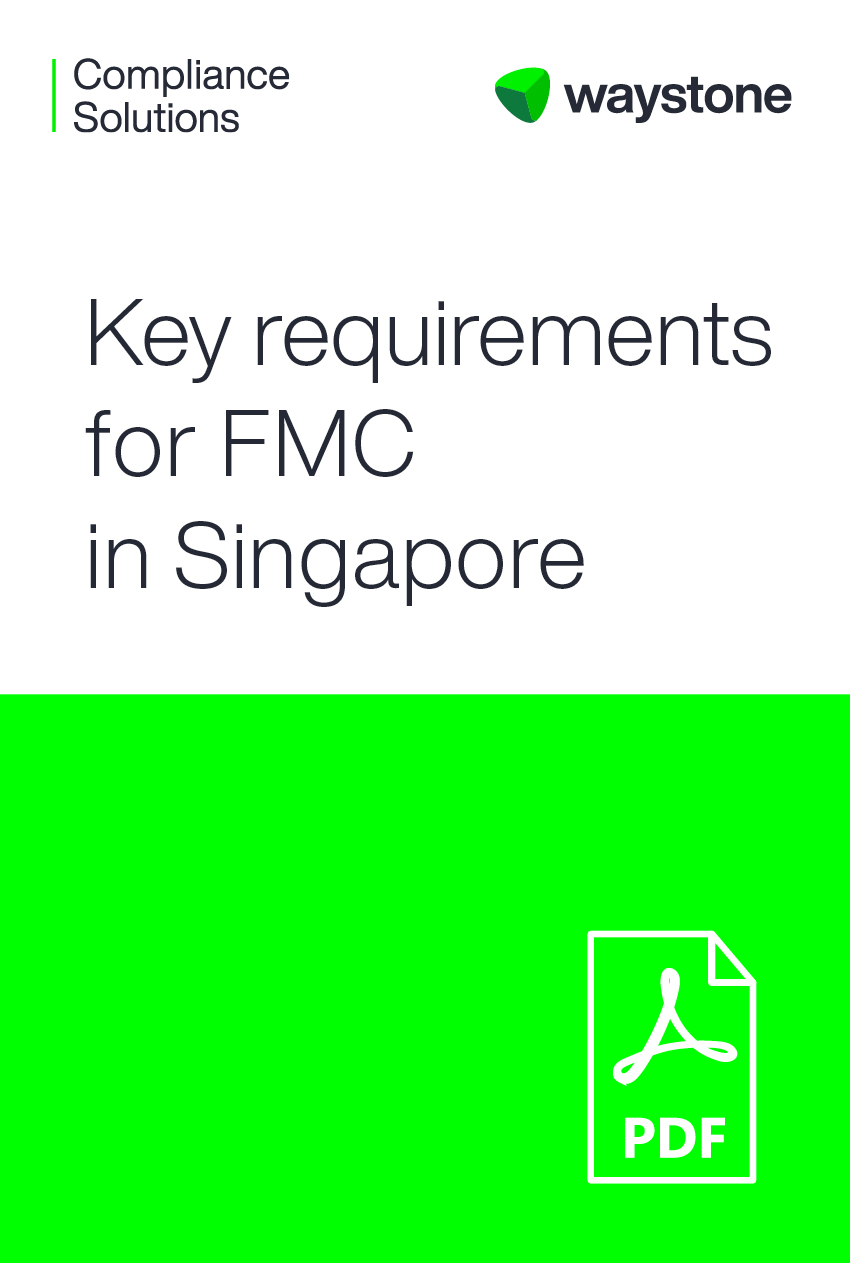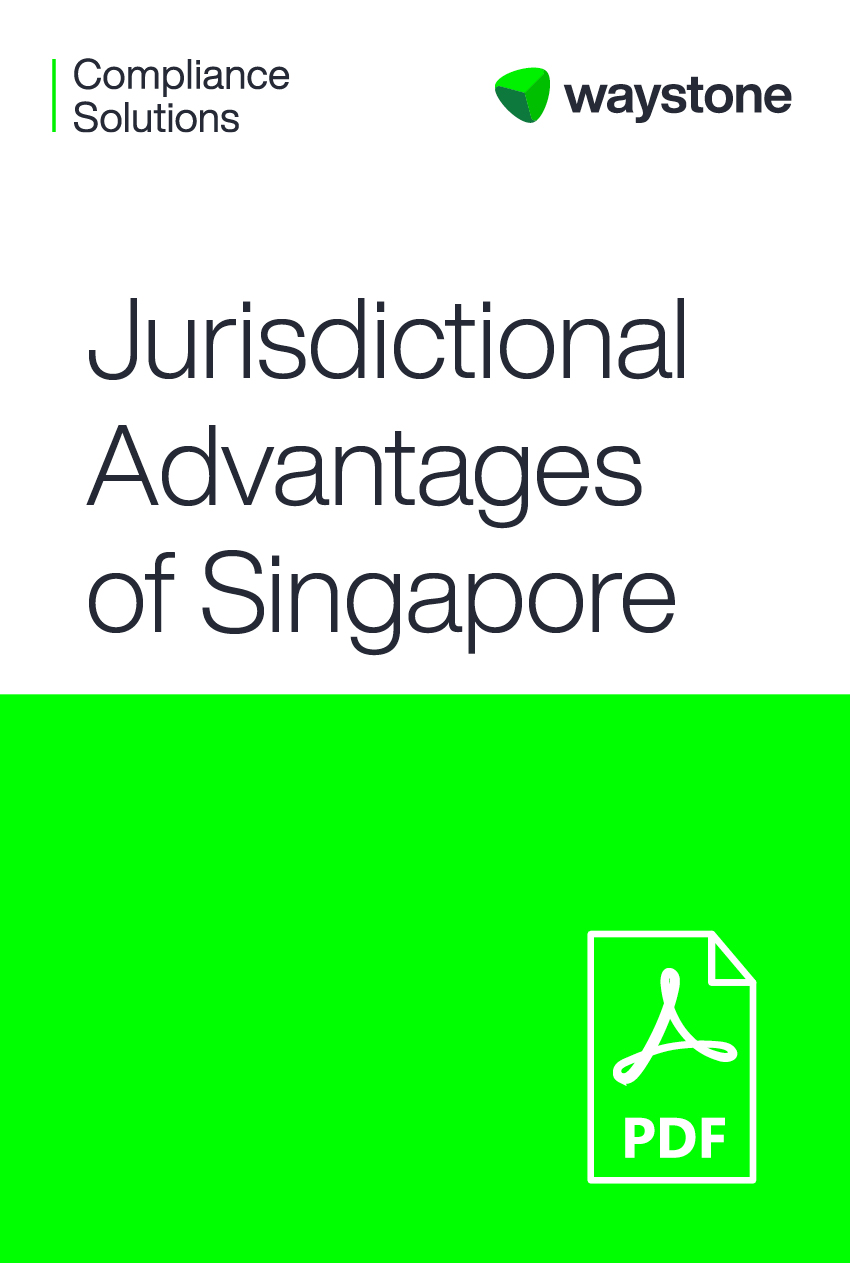Benefits of Setting Up a Fund Management Company in Singapore
Setting up a fund management company in Singapore offers numerous advantages, including access to the country’s robust infrastructure and favourable tax system. Other reasons why Fund Management Companies should set up in Singapore include:
- The competitive and transparent tax system
- Extensive tax treaty network worldwide
- Territorial tax system
- No capital gains tax
- Tax exemptions specifically for the fund industry
- Numerous other tax incentives available to all Singapore companies
- OECD whitelist
- Strong regulatory environment and investor protection
- Ease of doing business
- Effective legal system
- Skilled local workforce
- English as the first language
- Fund management hub for a vast number of financial institutions and service providers.
Fund Management Company FAQs
How Waystone Compliance Solutions can help
Waystone Compliance Solutions provides the full spectrum of compliance services for Fund Managers interested in setting up a fund management company in Singapore. Our dedicated APAC compliance team comes with extensive knowledge, diverse experience, and the ability to react fast. This enables clients to rely on us in this manner so much so that we are an extension of their team. Our regulatory compliance services include the following:
- Setting up your business – We will incorporate the appropriate structure.
- License Application – We will analyze your business type and help you put a regulated business plan together with your license application. We’ll also check all relevant documentation to be provided to the MAS prior to the submission of your license application.
- Compliance policy and procedure – We ensure that your policies and procedures are adequately set up to complement your business strategy.
- Risk Management & Corporate Governance – We set up your Risk Management Framework & Compliance Monitoring Plan to ensure that the implemented policies and procedures are executed accordingly.
- Compliance Monitoring & Ongoing Compliance – Our team will be at your fingertips to ensure that any queries or questions relating to your fund management company’s compliance are resolved.
Learn more about our Singapore Licensing & Registration Solutions
Key Requirements for Singapore Fund Management Companies
Other Key Requirements for Managing Funds in Singapore
- Fit and Proper
- Fund administration
- Annual Independent compliance Audit
- Anti-Money Laundering (AML Framework)
- Custody arrangement
- Tax regimes for funds and fund managers
- The Tax Exposure of Funds Managed by a Singapore Fund Manager
- Synopsis of Tax Incentive Schemes in Singapore for Funds
- Fund set-up options
- Companies
- Unit Trusts
- Limited Partnerships
- Variable Capital Company (VCC)
Fit and Proper Criteria
A Singapore Fund Management Company should satisfy MAS that its shareholders, directors, representatives, and employees, as well as the Fund Management Company itself, are fit and proper, in accordance with the Guidelines on Fit and Proper Criteria issued by MAS. The purpose of these guidelines is to safeguard the interests of clients and investors, maintain the stability of the financial system, and enhance the overall reputation of the financial industry in Singapore.
Fund Administration
Fund Management Companies are required to have fund administration managed independently, or have adequate segregation of duties, particularly in the performance of functions such as valuation or fund accounting, acting as a fund register, and client reporting (e.g. sending of monthly account statements).
Annual independent compliance audits
Fund Management Companies need to have an external auditor to perform an annual independent compliance audit. Auditors provide the auditor’s report with their opinion on the financial statements and their compliance with key licensing and business conduct requirements to MAS, this is one of the mandatory requirements for all Fund Management Companies.
Anti-Money Laundering (AML) Framework
To operate in Singapore, Fund Management Companies need to have robust Know your Customer (KYC) policies in place. It is mandatory for all Fund Management Companies to have an anti-money laundering framework to identify, assess, understand and address its money laundering and terrorism financing risks.
Custody Arrangement
Fund Management Companies need to place customers’ monies and assets with a custodian who is licensed, registered, or authorised (to perform the custodial function) in the jurisdiction where the monies or assets are being held. Notwithstanding that a Singapore Fund Management Company would not have direct responsibility for appointing the custodian, it must be able to demonstrate that it has taken reasonable steps to ascertain that the assets are subject to adequate safeguards including independent custody.
Tax Regimes for Funds and Fund Managers
Singapore is a vital location for managers of private equity, real estate and hedge funds to be based in, especially for investments in the Asia Pacific region. Singapore is also increasingly being used as a preferred location for fund vehicles (funds). The rapid growth of the fund management industry in Singapore can be accredited to several factors, including the ease of doing business in Singapore and attractive tax incentives for funds and fund managers. Outside of the traditional offshore funds’ jurisdictions such as the Cayman Islands, Singapore is viewed as having one of the most attractive regulatory and tax regimes for funds and fund managers.
The Tax Exposure of Funds Managed by a Singapore Fund Manager
Singapore based fund managers that manage funds may be liable to tax in Singapore due to territorial activity. The fund manager may create a taxable presence in Singapore for the fund (whether onshore or offshore) and, therefore, certain income and gains derived by the fund may be considered as Singapore-sourced and liable to tax in Singapore. However, this tax liability could be eliminated under Singapore’s tax incentive schemes for funds, provided that certain conditions are met.
Synopsis of Tax Incentive Schemes in Singapore for Funds
There are three main tax exemption schemes available to funds managed by fund managers in Singapore under which “Specified Income” (including gains) derived by the fund from “Designated Investments” is exempt from tax. All funds that are subject to any of the tax incentive schemes as of 31 March 2019 may enjoy the tax exemption for the life of the fund, subject to the funds continuing to meet the relevant conditions of each scheme.
How to set up a fund in Singapore
Funds in Singapore can either be set up as companies, unit trusts, limited partnerships, or variable capital companies (VCC).
1. Private Limited Companies
The preferred structure for funds investing in Asia is the private limited company (“PTE LTD.”) as Singapore’s tax treaties only apply to companies. Opting for the PTE LTD structure requires compliance with the Singapore Companies Act. In practice, this means that:
- The fund management company has to make annual filings to both the registrar (ACRA) and the tax authorities (IRAS)
- Any subscriptions or redemptions from the fund need to follow the requirements of company law
- Certain information about the fund is publicly available
- Investors invest in funds structured as companies usually via redeemable preference shares, with the promoters of the fund holding the ordinary shares
- Upon issuance or redemption of preference shares, companies must prepare the relevant resolutions and update the details with ACRA
2. Unit Trusts
Mutual Funds often elect to form a Unit Trust, which offers the advantage of not being governed by the Singapore Companies Act. However, there is the need to appoint an Approved Trustee of a Unit Trust, a form of Collective Investment Scheme (CIS), possibly increasing the cost of running the structure.
3. Limited Partnerships
Limited Partnerships are a popular vehicle for funds worldwide. In Singapore, these are governed by the Limited Partnership Act. Limited Partnerships offer fewer annual compliance requirements and less public disclosure than companies. However, Singapore’s tax treaties do not apply to limited partnerships.
4. Variable Capital Company (VCC)
This fund structure is applicable to both open-ended and close-ended funds The benefits of a VCC structure are:
- Flexibility in terms of managing investment funds in Singapore
- Will help fund managers achieve cost efficiencies
- Help facilitate re-domiciliation of funds
- Help reap the benefits of tax treaties and tax exemption schemes
To find out more about the key requirements for a Singapore fund management company or learn about licensing and registration in Singapore, contact the team at Waystone Compliance Solutions today.


